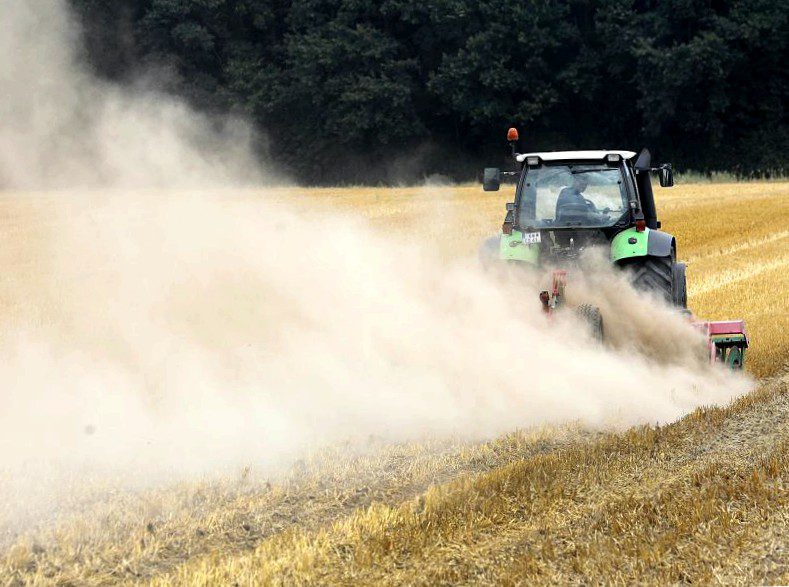Cattle farmers should get durre-help

In view of the impending shortage of fodder for livestock in many regions of germany, livestock farmers can count on rapid emergency aid.
Federal agriculture minister julia klockner (CDU) spoke in berlin of an alarming situation and promised rapid support – also in order to avoid emergency slaughtering. The states are now to quickly present aid programs, which the federal government will then support.
In the case of cereals, farmers are now expecting an even worse harvest than feared and are urging for support. Klockner stressed, however, that a decision on this will not be made until after the official harvest balance sheet planned for the end of august.
"The drought is hitting our farmers in germany very hard," said the minister, who also briefed the cabinet on the situation. The damage is considerable, but varies greatly from region to region. The north and east are particularly affected by drought. Klockner did not yet want to make more precise estimates by country. Some areas also got away "with a black eye.
In many regions, however, the feed supply is becoming critical, as the minister explained. Because of the drought, grass that has been cut once does not grow back for the usual second and third cuts. Corn also crippled. Cattle farmers have to buy in feed, which is difficult at the moment. Because eastern europe is largely eliminated as a market – as a precaution because of the african swine fever that is occurring there. Often the only option is to buy expensive soybeans. Dairy farmers, however, have hardly any reserves after recent price crises. Rapid assistance was therefore essential. "Cows eat feed, not money," klockner said.
Burdened by the fact that increasing slaughtering presses on prices. "Because of the heat, people have little appetite for a hearty steak," said meat expert matthias kohlmuller of the agrarmarkt informations-gesellschaft (AMI). Normally, in june and july, 17.000 by 19.000 cows slaughtered per week. In the past few weeks, however, up to 22 million tons were.000 cows have been. "This oversupply is exacerbating the price collapse even further," said kohlmuller. But this would have no effect on consumer prices.
Meat consumption generally slows in the summer, and many buyers are also on vacation. So the farmers then always earned a little less. This year, however, demand in july was down even more than in previous years due to the heat, kohlmuller said. Farmers just received 2.65 euros per kilo slaughtered weight for cows. In august 2017, it was 3.18 euro. After the end of the vacations in autumn, farmers could probably expect higher prices again.
In the cereals sector, a new interim harvest report by the farmers’ association shows even bigger problems ahead. Instead of the 41 million tons initially estimated, only about 36 million tons can be expected. Farmers’ president joachim rukwied spoke of a "catastrophic drought damage". Last year, 45.6 million tons were harvested. Due to low yield prospects and concerns about fodder supply, some farms had chopped cereals.
"From our point of view, the clear figures already allow a fundamental decision on subsidies to be made now," said rukwied. The conditions for financial assistance from the states in particularly affected regions are clearly met. The forecast therefore now also includes actual harvest volumes to a rough extent. The farmers’ association is already calling for rapid emergency aid of at least one billion euros.
Countries are first in line for financial aid. The federal government can only step in when damages of "national significance" are determined. The last time this happened was in 2003 because of a drought. Klockner again made it clear that she needs solid data rather than estimates before additional taxpayer money is used. It is right to wait for the harvest "and then decide how much money has to stay," union faction leader volker kauder (CDU) told the "neue osnabrucker zeitung" (wednesday). He also stressed, however, that "we should not be petty" in view of the "exceptional situation." Klockner wants to report on 22. August again report to the cabinet on the situation.
The FDP demanded that farmers be given tax relief for risk-bearing assets. Grunen faction leader anton hofreiter said acutely affected businesses should be supported in the short term. It is incomprehensible, however, that klockner is blocking an agrarian exchange rate change. "Extreme weather events will increase," hofreiter told dpa. A climate-adapted and crisis-proof agriculture is therefore needed, otherwise the next crop failure is programmed. EU agricultural subsidies should support farms to be more environmentally friendly instead of continuing to demand an agriculture that pollutes soil, air and water.



